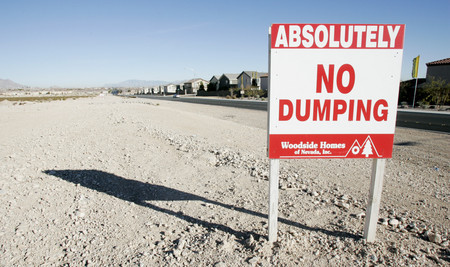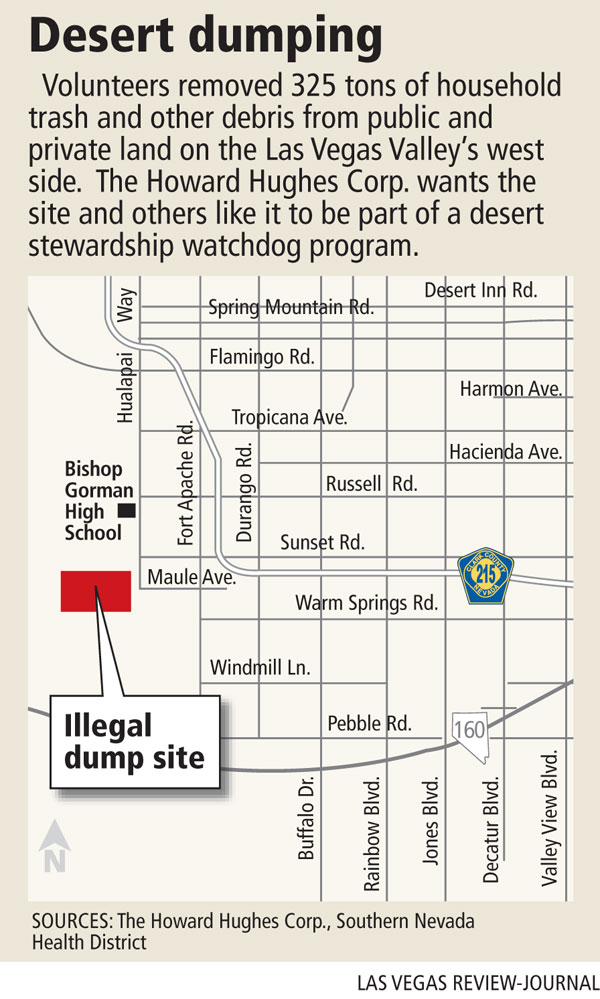Trash piling up in desert
The Las Vegas Valley's economic downturn is taking a toll on the desert around it, with more household items and trash being illegally dumped.
And those who are doing the dumping are not paying for it like they used to. Collections of fines imposed on violators have been on a steady decline for years.
It's a sign of the home foreclosure crisis and the state of the local economy, said a spokesman for The Howard Hughes Corp. real estate development company.
"We do believe the economy has a lot to do with what we're seeing here," said Tom Warden, the company's community relations vice president and advocate for a desert stewardship watchdog program.
"We've seen people dump furniture and household trash in broad daylight. We're seeing less construction debris and more household debris. It sure seems reasonable that it's a result of the foreclosures."
Nevada leads the nation in home foreclosures, with Las Vegas having topped the list of areas nationwide until recently when it slipped into fifth place.
In less than three months since The Howard Hughes Corp. and local entities removed more than 325 tons of trash from desert on the city's western edge, a few discarded sofas and kitchen sinks have turned up there again, not far from where "no dumping" signs are posted.
"To me it doesn't make sense to clean it up and let it get dirty again," Warden said.
In November, the company offered to match rewards to people who turn in violators who are assessed fines by the Southern Nevada Health District for dumping on the corporation's 7,000 acres.
The health district's board approved doubling the current $100 reward, but in order to do so regulations need to be changed.
Near the end of 2009, fewer than 23 percent of assessed fines, $95,000 out of $424,000, was collected by the health district. Of 60 rewards that people applied for, only 18 were paid out, primarily because fines hadn't been fully collected. The district pays rewards when fines are collected, but the agency is looking to do so sooner as an incentive to witnesses who provide information on dumpers.
"Sometimes when a case is being adjudicated, they (violators) can't pay all the penalty at once," said Dennis Campbell, the district's environmental health manager for solid waste and compliance.
The district has seen fine collections decrease steadily. In 2002, 89 percent of penalties were collected. In 2008, 49 percent were collected; in 2009, 22.5 percent.
That doesn't bode well for curbing the problem. The places where illegal dumping occurs are "too numerous to count. They're all over the place," Campbell said.
His staff of 10 field inspectors responds to about 1,800 complaints a year. Of those, only 13 percent result in violation notices. Inspectors often come upon trash and have no solid leads to go on as to who did the dumping.
Much of the problem with disposing of large household items and landscape materials could be avoided without violators having to risk fines that can range from $500 to $5,000, or more.
"It doesn't make much sense to me to see a couch dumped out in the desert when all you have to do is call Republic Services, and they'll come and get it for you," Campbell said. Republic Services operates the regional Apex landfill, north of Las Vegas.
Illegal dumping occurs on vacant private land as well as public land controlled by the Bureau of Land Management.
Where the volunteer cleanup event was held in October, near West Maule Avenue and South Hualapai Way, the area consisted of 45 acres of land managed by the BLM and 300 acres owned by The Howard Hughes Corp.
In 2009, the BLM conducted 61 cleanup events that netted 3,133 cubic yards of waste removed from 820 acres. Nearly 900 volunteers pitched in to help.
Meanwhile, a pile of rebar-laced rubble that sits on public land near Ann Road and the Las Vegas Beltway is still there five years after it was dumped, and more than a year after authorities acknowledged the 80,000 cubic yards of concrete and asphalt came from a demolished taxiway project at McCarran International Airport.
BLM spokeswoman Kirsten Cannon said the agency has decided to include the rubble pile in a reclamation plan that seeks to recycle some of the material.
Fitting with the theory that dumped debris attracts more dumped debris, the pile has grown to include pickup-size loads of fresh fir tree trimmings and a row of file cabinets from a portable office that somebody set on fire.
Contact reporter Keith Rogers at krogers@reviewjournal.com or 702-383-0308.


















